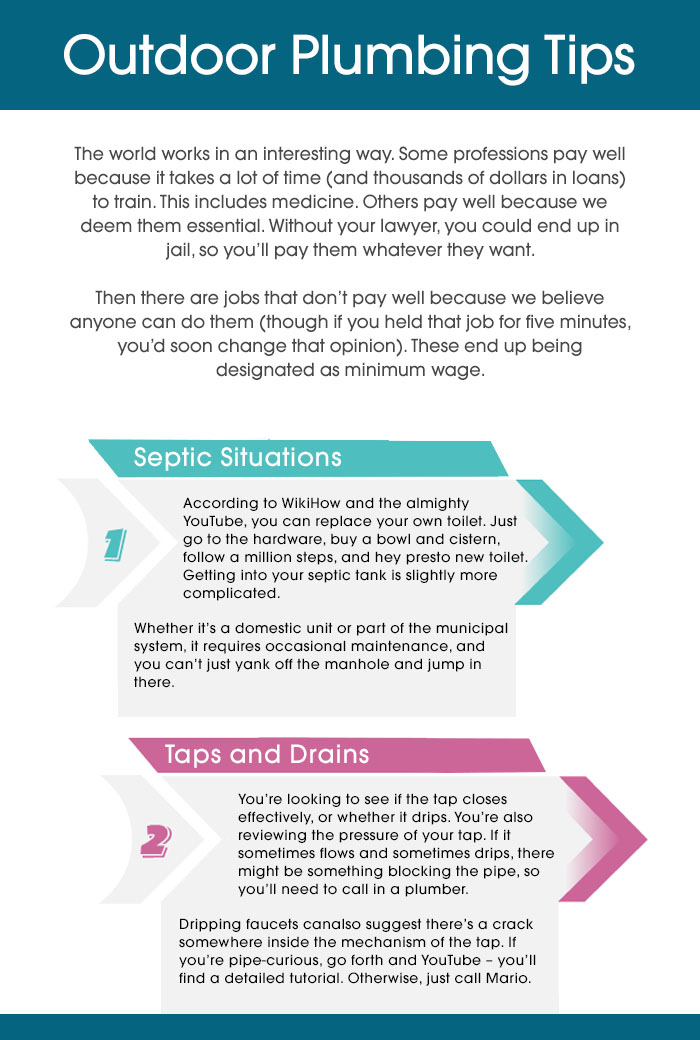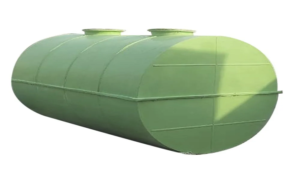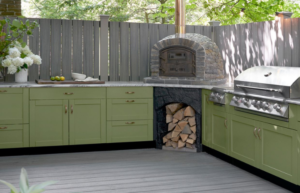Outdoor Plumbing Tips

The world works in an interesting way. Some professions pay well because it takes a lot of time (and thousands of dollars in loans) to train. This includes medicine. Others pay well because we deem them essential. Without your lawyer, you could end up in jail, so you’ll pay them whatever they want. Then there are jobs that don’t pay well because we believe anyone can do them (though if you held that job for five minutes, you’d soon change that opinion). These end up being designated as minimum wage. Third, there are jobs nobody really wants to do, but they require special skills, so they earn a premium.
This last point is debatable. After all, services like child care, education, construction, and plumbing are crucial. In the western world, these jobs can earn you a good income. In the third world, they’re considered ‘family business’ because they were traditionally done by family members, and families were large enough that there was always someone available to look after the kids, teach them cultural expectations, or build a new house. This means even today, when these tasks have to be outsourced, people don’t pay very much for them.
Here in the western world though, plumbing is one of those premium services. If your toilet breaks in the middle of a dinner party or your kitchen flood in the middle of the night, you’ll part with a fortune to get that repaired. That emergency plumbing though. There are some more basic tasks you can do on your own. Let’s look at a few outdoor plumbing fixes you can do at home, with or without the assistance of YouTube, starting with the toilet.
Septic situations
According to WikiHow and the almighty YouTube, you can replace your own toilet. Just go to the hardware, buy a bowl and cistern, follow a million steps, and hey presto new toilet. Getting into your septic tank is slightly more complicated. Whether it’s a domestic unit or part of the municipal system, it requires occasional maintenance, and you can’t just yank off the manhole and jump in there. There’s a reason there are so many documentaries and legends about fatbergs and alligators in the sewers (of New York).
But while you can’t dive in wellies-first, you can do a few other things. Like, take notes. That’s not as silly as it sounds. Your septic tank needs to be inspected two or three times a year, just to make sure everything is flowing as it should. And because you don’t always get the same plumber, it helps to keep detailed records of who visited, when, and what they said. You may need their feedback for the next visit, or for a home insurance claim. Note down any repairs they made (and how much they billed). You also need a sketch of your septic system.

Once in three years (or five years for smaller households) your septic tank should be pumped and evaluated. You can’t do that yourself, but you can still keep detailed notes. If you’ve had any yard work done that required permits or adjustments to the sewers, keep a record of that too. If nothing else, your cost-based observations will jog your memory in case the next Sydney plumbers try to overcharge you.
Taps and drains
You’re probably pretty good about routine home checks – making sure doors and windows are locked at night, and that taps are closed when you leave the house. Extend this habit outdoors. Check all your faucets and if there are more than three, use a checklist system. You can even draft a little map to give your house-sitters while you’re away. Every day (or maybe once a week), walk to each tap, open it, and let it run for a few seconds. Ideally, it should run into a bucket or cup to avoid wastage. Then, close the tap.
You’re looking to see if the tap closes effectively, or whether it drips. You’re also reviewing the pressure of your tap. If it sometimes flows and sometimes drips, there might be something blocking the pipe, so you’ll need to call in a plumber. Dripping faucets can also suggest there’s a crack somewhere inside the mechanism of the tap. If you’re pipe-curious, go forth and YouTube – you’ll find a detailed tutorial. Otherwise, just call Mario.
As for your drains, it’s more about cleaning than plumbing. Sweep, blow, or vacuum them to get rid of dead leaves, fallen twigs, and other dirt that may pile up and risk blockage. Regular drain checks will help you spot backed-up pipes before they get stagnant, start to stink or raise a scourge of mosquitoes. You may also need to periodically pour commercial de-clogging products down your drains, or inside your septic tank.
Read More:





